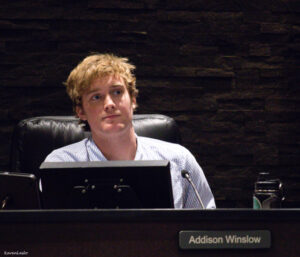by Yucheng Tang
posted Feb. 24
Councilmember Addison Winslow complained at the Feb. 18 City Council meeting that there were “cockamamie” procedural objections that blocked his effort earlier this year to ensure there will be future discussion on redistricting and how it’s done.

“I wanna believe that this is the last time that we have an issue like that,” Winslow said from the dais during the public comments section of the meeting. “I think the least that we can do is maintain a legitimate public decision-making process.”
Newly-elected Councilmember Bryce Goldstein, at the Jan. 28 meeting, made the motion to direct staff to return with information regarding the application of several reforms, including the possible establishment of an independent redistricting commission.
After Goldstein’s motion for electoral reform failed on a 4-3 vote at that meeting, Winslow moved to table discussion on an independent redistricting commission to September 2028. That effort was met with objections from both Mayor Kasey Reynolds and Councilmember Tom van Overbeek.
“I don’t think we can do a follow-up motion,” Reynolds said. “Can we do two motions on one item?” she asked, turning to the city clerk and city attorney.
City Attorney John Lam indicated that the motion should be disqualified. He said at the meeting that Winslow’s motion was “an attempt to try to reopen that discussion on that failed motion.”
Redistricting is the process of redrawing election district lines so that each district is “substantially equal in population.” Redistricting is undertaken every 10 years in connection with new data from the U.S. Census. The FAIR MAPS Act states that “boundaries shall not be drawn for purposes of favoring or discriminating against a political party.”
“We saw in the first and second processes in Chico, two different political majorities on the City Council, who, in some opinions, kind of drew district lines in favor of themselves,” Goldstein said at the January meeting, noting that both liberals and conservatives have been accused of manipulating district boundaries to their advantage.
Winslow said he later consulted experts in municipal law who said the disqualification was “absolutely wrong” because his and Goldstein’s motions “would have produced a totally different outcome.”
“This is ridiculous that you can’t have multiple motions on an item,” he told ChicoSol in a phone interview.
Lam acknowledged in a follow-up email to Winslow that “a motion that is substantially different from the failed motion could be made.”
Lam also responded to ChicoSol questions in a Feb. 21 email, indicating he has reconsidered and reversed his position.
“Following the January 28th, I’ve had the benefit of reviewing the council meeting video and determined my initial understanding of the motion was inaccurate,” he wrote. Lam noted that his initial understanding was that the motion made by Winslow would constitute a “Motion to Reconsider,” which in fact has quite restricted use.
Winslow said he has considered bringing the motion back at some point before the next census. “Maybe in a year, we’ll try to bring it back again,” he told ChicoSol. “Probably closer to the (2026) election is a more sensible time when people are watching Council actions more.
“We need to get a fourth vote in order to have a discussion again in order to make that motion to table it again. It puts us several steps away,” he added.
Winslow pointed out that redistricting can determine the political majority of the Council because of the ways in which voters are grouped in the City’s seven districts. Winslow said he decided to speak during the public comment time at the most recent meeting because, “to a certain extent, the public, too, should be aware of how our rules work.”
Yucheng Tang is a California Local News fellow reporting for ChicoSol.
